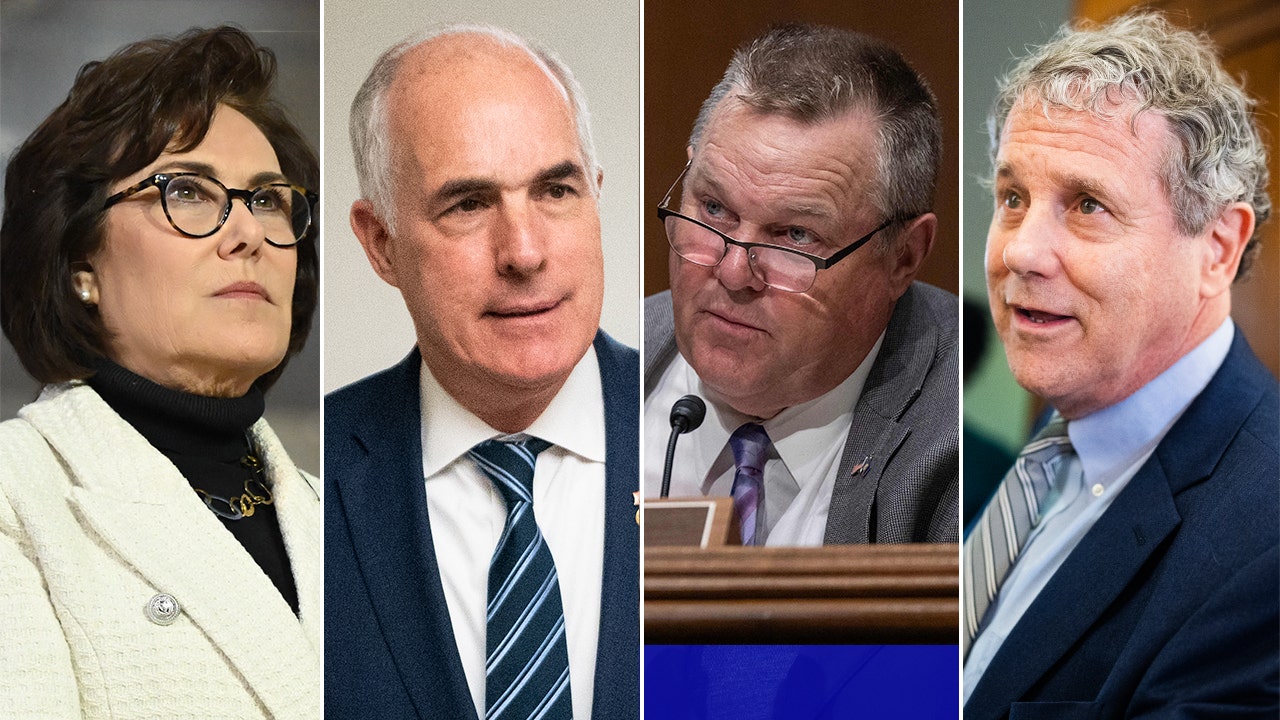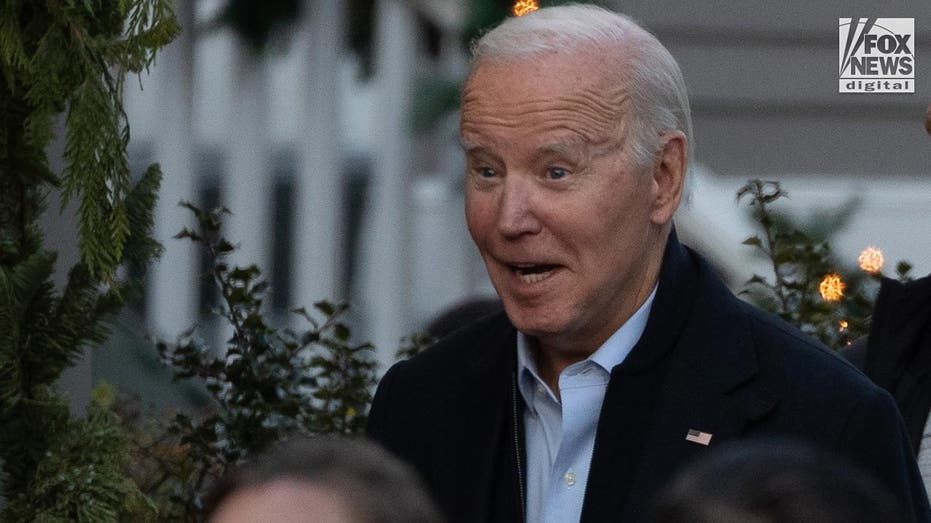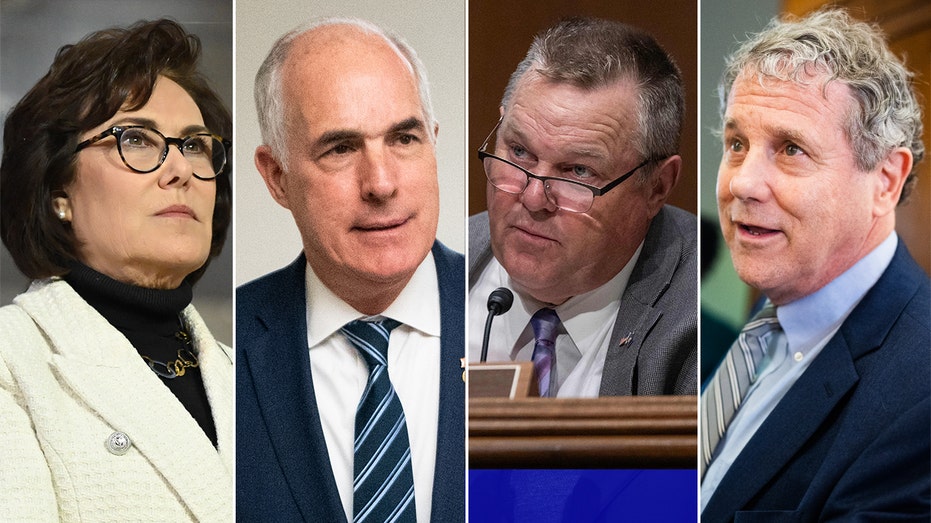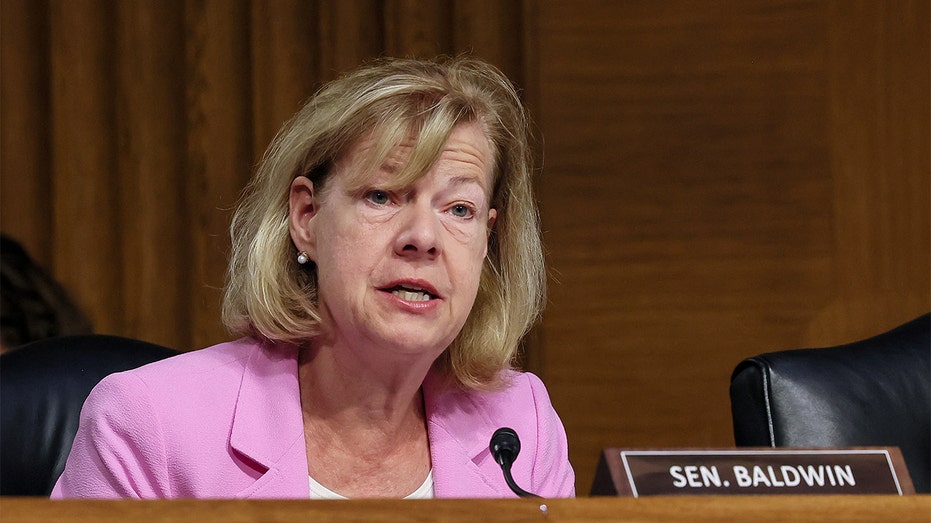
Bob Nardelli gives his economic outlook and long-term higher prices on “Maria Bartiromo’s Wall Street.”
A number of Democrats facing tough reelection fights next year are being haunted by their past support for one of President Biden’s signature pieces of legislation that experts say is causing a “dramatic rise” in Medicare costs for seniors.
Those Democrats, who largely represent states being targeted by Republicans as the biggest flip opportunities in the 2024 elections, all touted their support for the Inflation Reduction Act (IRA) and said it would lower health care costs for seniors, specifically when it came to prescription drugs.
That does not seem to be the case, however, as experts say the IRA is driving up Medicare Part D prescription drug premiums by as much as a whopping 57% in some states, compared to 2023.
ON INFLATION REDUCTION ACT ANNIVERSARY, ENERGY GROUPS DEMAND END TO ‘GREEN NEW DEAL-TYPE POLICIES’

President Biden walks along Broad Street in Nantucket, Massachusetts, on Nov. 24, 2023. (Gediminas Svitojus for Fox News Digital / Fox News)
“I proudly helped pass legislation to let Medicare negotiate for lower Rx drug prices & this announcement is an important step towards that goal,” Sen. Jacky Rosen, D-Nev., wrote in a post on X (formerly Twitter) in August that cited concern over seniors being unable to afford their medications.
“One year ago, Democrats enacted the Inflation Reduction Act to fulfill President Biden’s promise to lower costs for families and tackle the climate crisis. Because of this law, seniors and families are spending less on their prescription drugs,” Sen. Bob Casey, D-Pa., said in an August press release in celebration of the IRA.
In March, Sen. Jon Tester, D-Mont., called the IRA a “game changer” when it came to “cutting costs” for Medicare recipients before saying in August that the law was going to “keep folks’ hard-earned money in their pockets” because of lower prescription drug prices.
SOCIAL SECURITY: COLA INCREASING BUT MEDICARE COSTS ALSO RISING IN 2024
Sen. Sherrod Brown, D-Ohio, echoed those claims in an August press release in which he said that he and his colleagues were “finally making progress to bring down drug prices for seniors.”

From left: Sens. Jacky Rosen, D-Nev., Bob Casey, D-Pa., Jon Tester, D-Mont., and Sherrod Brown, D-Ohio (Getty Images / Getty Images)
“The Inflation Reduction Act finally takes on the drug companies to lower drug prices, particularly for Americans on Medicare,” he said.
Sen. Tammy Baldwin, D-Wis., also celebrated the law in August, stating in a press release: “The Inflation Reduction Act is making a real difference in the lives of Wisconsin’s working families, and I am proud to have voted for it.”
BIDEN ADMINISTRATION SAYS MEDICARE OWED REBATES FOR DRUG PRICES THAT OUTPACED INFLATION
She said seniors in Wisconsin were “saving hundreds of dollars a month on the cost of their prescription drugs.”
Other Democrats running in what are expected to be some of the tightest races next year also touted the IRA, including Rep. Ruben Gallego, D-Ariz., who is hoping to win the Senate seat currently held by independent Sen. Kyrsten Sinema, and Rep. Elissa Slotkin, D-Mich., who is vying to replace retiring Democrat Sen. Debbie Stabenow.

Sen. Tammy Baldwin, D-Wis. (Jemal Countess / for JDRF / Getty Images)
“Arizona seniors will see lower costs for some of the costliest prescription drugs thanks to our hard work to pass the Inflation Reduction Act,” Gallego wrote in a post on X; and Slotkin said in a press release, “The bill will cap insulin costs at $35 per month for seniors, keep insurance premiums low for Michiganders and finally allow Medicare to negotiate for lower prescription drug prices.”
According to a study by HealthView Services, a leading provider in health care cost planning, the IRA is driving up Medicare Part D drug costs by as much as 57% in some states, compared to 2023, based on the largest Medicare providers in Florida, California, Texas, New York and Pennsylvania.
SOCIAL SECURITY ADMINISTRATION BURDENS SENIORS WITH PUSH FOR CLAWBACKS, LAWMAKERS SAY
“Significantly more expensive premiums will come as a shock to the millions of retirees enrolled in Medicare Part D plans who … may have been anticipating lower costs with the introduction of the Inflation Reduction Act,” Ron Mastrogiovanni, president of HealthView Services, told Employee Benefit News in a November report.
The report detailed how the IRA could actually be causing the increases, including that it set “a $2,000 cap on how much Medicare recipients spend out of pocket on drugs per year,” which benefits those with the largest medical bills.

Rep. Ruben Gallego, D-Ariz. (Bill Clark / CQ-Roll Call Inc. / Getty Images)
“But the money to cover the rest of those bills must come from somewhere, and insurers appear to be getting it from the seniors themselves,” the report said, adding that private insurance companies might now be passing costs onto consumers rather than absorbing them.
Another report by the Kaiser Family Foundation said that “although the Inflation Reduction Act included a premium stabilization provision that capped annual growth in the Part D base beneficiary premium at 6% beginning in 2024, the base beneficiary premium is not the same as the amount that Part D enrollees pay for coverage, and the law did not cap the growth in individual plan premiums to 6%.”
SMALL SOCIAL SECURITY COLA COULD LEAVE RETIREES STRUGGLING TO GET BY NEXT YEAR
It said that the average prescription drug plan premium in 2024 would be 21% higher than in 2023.
“This higher average projected premium is driven by higher expected plan costs to provide the Part D benefit in 2024, including a new cap on enrollees’ out-of-pocket spending above the catastrophic threshold rather than requiring them to pay 5% coinsurance, as in prior years. This change is based on a provision in the Inflation Reduction Act,” it added.

Rep. Elissa Slotkin, D-Mich. (Bill Clark/CQ-Roll Call Inc. / Getty Images)
When reached for comment, a spokesperson for Tester told Fox News Digital, “Sen. Tester will take on anyone, including Big Pharma and insurance companies, to lower costs for Montana’s working families. He’s proud to have delivered targeted legislation to cap the price of insulin at $35 bucks and cap annual out-of-pocket drug spending for Montanans on Medicare.”
CLICK HERE TO GET THE FOX NEWS APP
Fox Business has reached out to Brown, Casey, Baldwin, Rosen, Gallego and Slotkin for comment.





